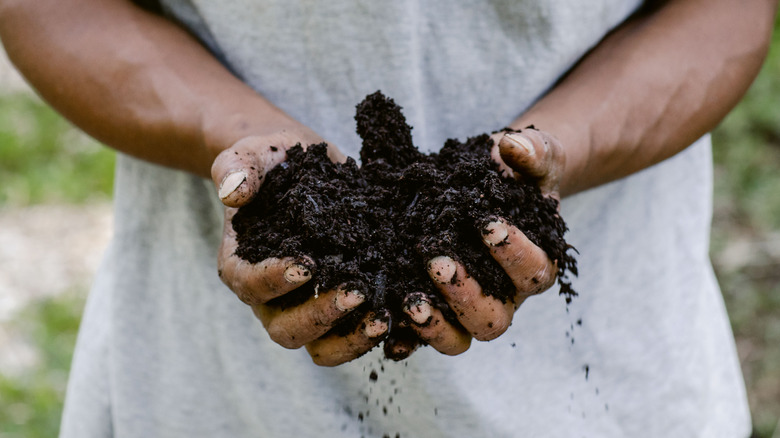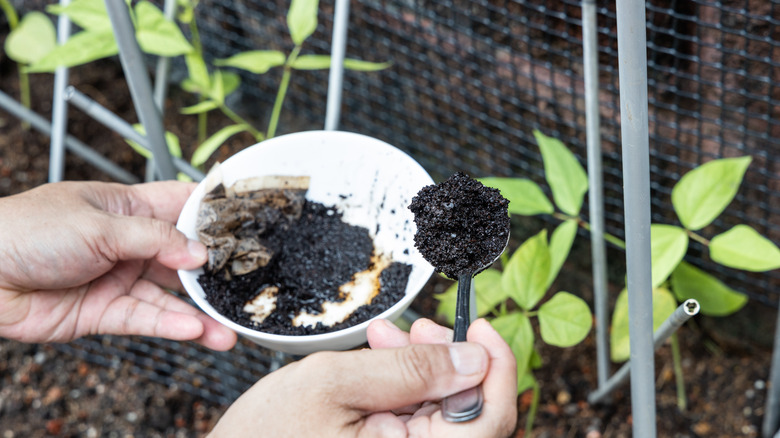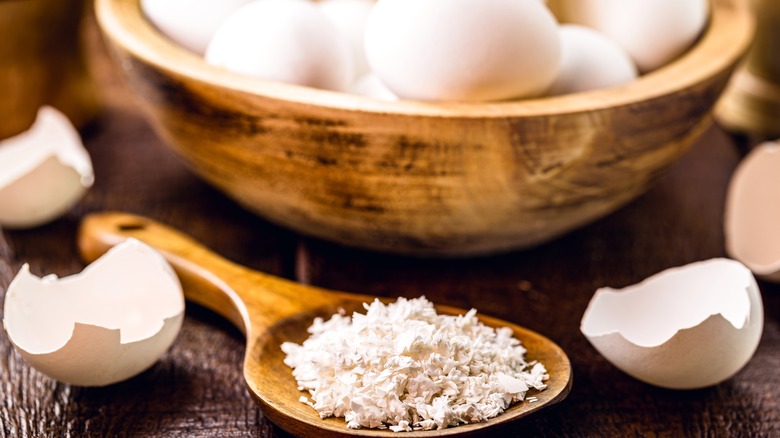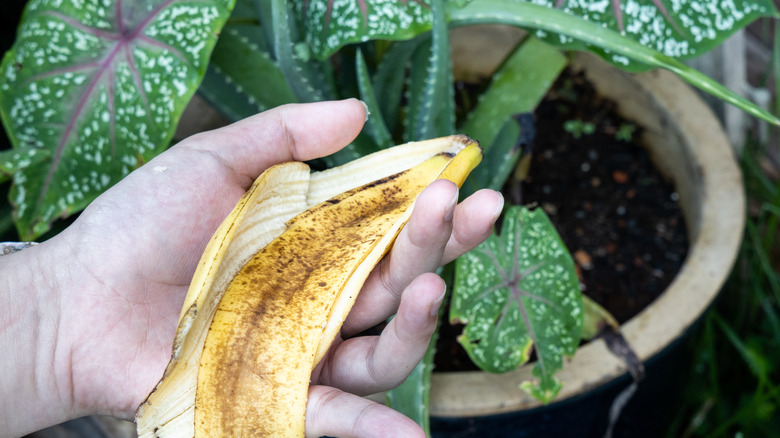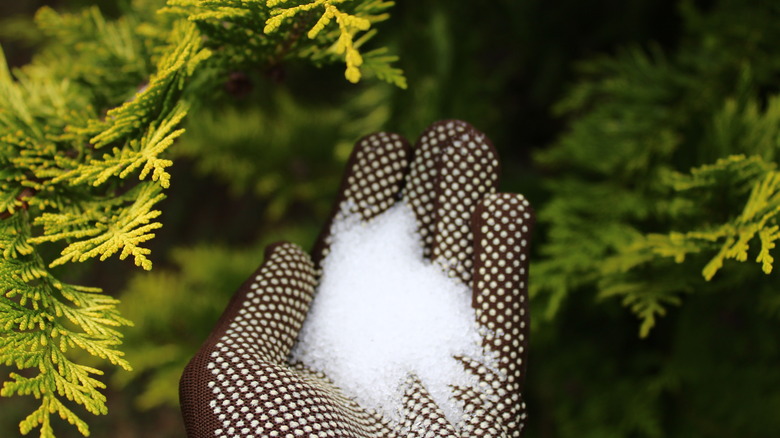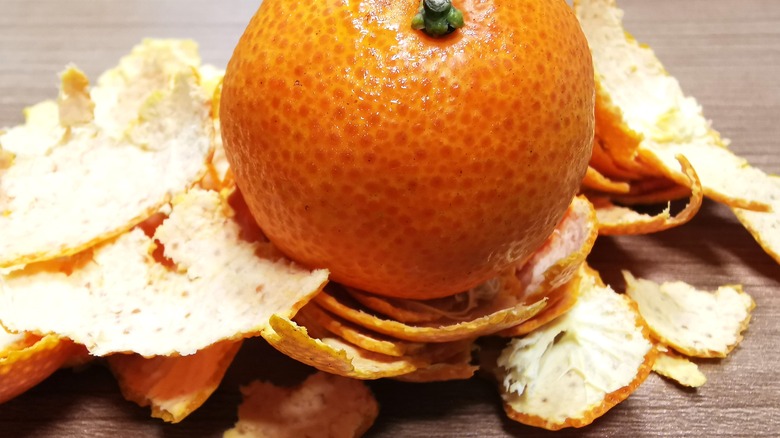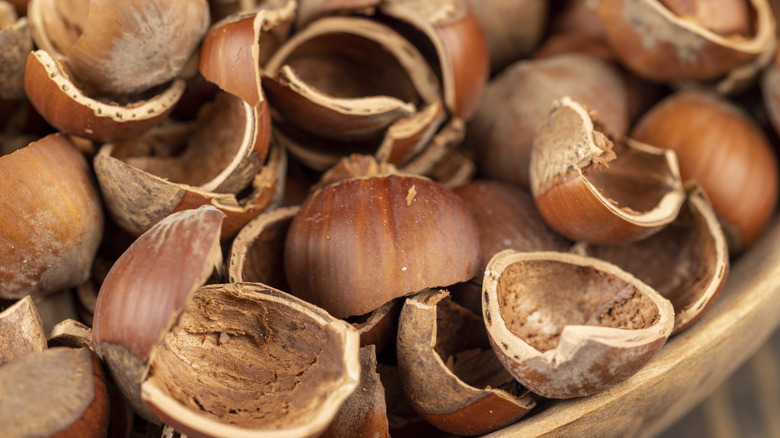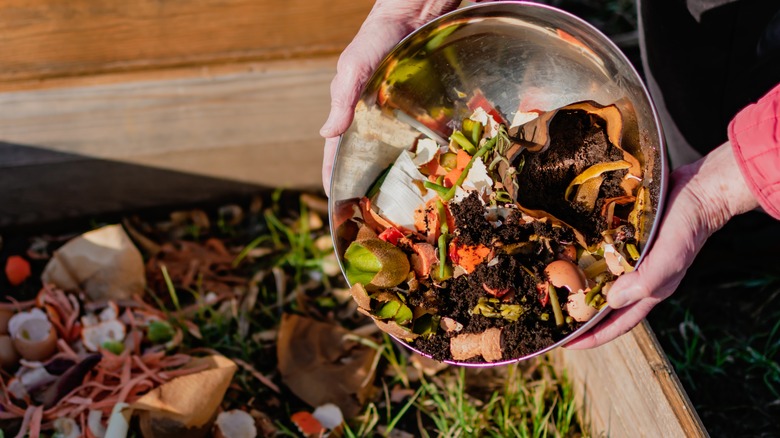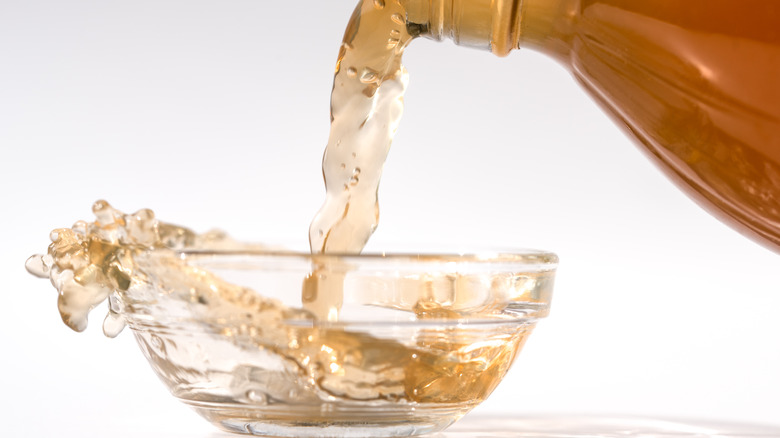Achieve Healthy Garden Soil With The Help Of These Kitchen Ingredients
Healthy garden soil should be rich in minerals, macronutrients, and organic matter, to help your lawn and plants thrive. Thomas Mrazik, a horticulturist, says via Penn State University, "I'm a 'soil first' gardener. I believe it is the most critical first step to creating and sustaining a healthy and productive garden." Sadly, not all garden soil is created equal, and the state of the soil in your backyard will largely be determined by where you live. However, there are plenty of ways you can improve the quality of your soil to encourage an abundance of healthy vegetative growth in your garden.
Every day, we throw away kitchen ingredients that could be saved from the garbage bin and put to good use elsewhere. From unexpected uses for leftover coffee grounds to unusual banana hacks you should be using in the home and garden, there are so many ways that food byproducts could be utilized to minimize waste and help the environment. If saving the planet isn't reward enough for using kitchen ingredients in the garden, the added bonus is that it can also save you money. By making use of leftover scraps such as eggshells and orange peels, you can improve the quality of your garden soil without spending a penny on fancy fertilizers and soil amendments. It's a win-win for your plants and your wallet.
Coffee grounds can improve soil drainage
There are lots of popular hacks floating around the internet touting coffee grounds as a miracle amendment for lowering the pH of soil, due to its acidic nature. While coffee itself is acidic, research from Oregon State University points out that used coffee grounds after they have been brewed in water have close to neutral pH levels, so they aren't of any use at all if you have alkaline soil you want to neutralize. However, coffee grounds can help to improve the structure of soil and effectively help it to drain better. This is key for the health of many plants that will die in soil that is waterlogged or slow draining. Kym Pokorny of Oregon State University, explains, "Coffee grounds are best at improving soil. As the coffee grounds feed the soil microbes, microbial glues are released that promote good soil structure and improve drainage."
The rookie mistake to avoid when using coffee grounds in the garden is applying them directly on top of your soil. This can create a barrier on the surface of the soil that repels moisture, which of course is not good for your plants' roots, and it could also encourage mold to form. Linda Brewer, Oregon State University Extension Service soil scientist, recommends working the spent coffee grounds into the soil at a depth of between 1/2 inch to 4 inches.
Eggshells can improve calcium levels in soil
When plants exhibit small and misshapen foliage or brown veining on the leaves, this can point to a calcium deficiency in the soil. You can make DIY tests to check the health of your soil, which can help to indicate where the specific issue lies. If you need to improve calcium levels, you can do this with eggshells left over from hard-boiled eggs or cake-baking. This works because eggshells are predominantly calcium carbonate, so when added to soil they can improve the nutrient content and reduce acidity.
To use eggshells in your soil, you'll need to grind them down to a fine powder, which could be achieved with a powerful blender. Christopher Enroth, a horticulture educator at the University of Illinois, explains, "Eggshells ground to a fine powder yield the quickest results, while large chunks of eggshells will take at least a year to break down making their stored calcium available perhaps the next growing season." This is backed up by a 2005 study from the Department Of Agronomy & Soils at Auburn University, which conducted research on eggshells in soil, concluding "dried and finely-ground shells would be an acceptable alternative to conventional agricultural lime as a source of calcium". The study also revealed that nitrogen in eggshells could also improve soil fertility. If you don't have the machinery to grind eggshells to powder consistency, crush them by hand as much as possible and apply these to soil for more gradual benefits.
Use banana peels as mulch or slow-release fertilizer
Bananas are not just a good source of nutrition for humans; they are also full of nutrients that can benefit soil to ultimately improve the health of plants. The next time you enjoy a banana, consider using the peel instead of throwing it in the garbage. Banana peels contain calcium and sulphur which strengthen root systems, potassium which aids fruit development, and magnesium which aids photosynthesis. They can be utilized as slow-release fertilizer or as a soil mulch to retain moisture and suppress weeds.
To make fertilizer from banana peels, you can simply chop them up and put them in a planting hole before settling the root ball of a plant in place. The peels decompose quickly to release the nutrients into the soil where they will be available for the roots to absorb. Alternatively, you could dry the banana peels in the sun and then blend them into a fine powder to work into the top layers of the soil. If using as a mulch, lay the banana peels on top of the soil and cover with a standard mulch to prevent a fruit fly infestation. The major drawback to using banana peels as fertilizer is the fact that insects are attracted to fruits, so avoid using this hack for houseplants.
Increase magnesium levels in soil with Epsom salt
Magnesium is a nutrient required by plants to photosynthesize. A magnesium deficiency in the soil could lead to plants exhibiting signs of poor health, such as early leaf drop, and yellow veining on foliage. You can combat a lack of magnesium in soil by adding Epsom salt to the growing medium. Epsom salt is not like regular salt, so don't be tempted to use your table salt in the garden. It is a mineral salt that contains magnesium, sulfur, and oxygen, which break down easily in soil when combined with water. Plants such as palms, rhododendrons, roses, tomatoes, and raspberries are known for needing help with magnesium levels, so these are prime candidates for benefitting from an Epsom salt application.
While Epsom salts are great for adding an immediate hit of magnesium to soil, the water solubility of this common household item means it doesn't help to improve long-term soil health. It will quickly leach below root level, especially in free-draining soils such as sandy soils, where plants cannot benefit from it. Because of this, the Royal Horticultural Society recommends Epsom salt as a quick fix for magnesium deficiency in plants as a foliar spray. They suggest diluting 1/3 oz of Epsom salts per pint of water and spraying the mixture onto leaves every two weeks through summer. To amend the soil, apply 1 oz of Epsom salts per square yard at the base of plants.
Make your soil richer with orange peel and pulp
If you're a fan of citrus fruits like oranges, you can utilize leftover peel and pulp from your juicer to make your garden soil richer and your plants more lush. This unlikely fertilizer was discovered by researchers at Princeton University, who studied the effects of orange waste on a formerly barren pasture in a conservation area in Costa Rica. Thousands of tons of orange peel were dumped onto the ground in 1997, and 15 years later the land was overgrown and thriving. Jonathan Choi, co-author of the "Low-Cost Agricultural Waste Accelerates Tropical Forest Regeneration" research paper produced in conjunction with Princeton University, commented, "The site was more impressive in person than I could've imagined. While I would walk over exposed rock and dead grass in the nearby fields, I'd have to climb through undergrowth and cut paths through walls of vines in the orange peel site itself."
For richer and more nutrient-dense soil in your garden, apply citrus peels containing phosphorus and potassium directly to the root areas of your plants. Chop up orange peels into small pieces and dig them into the top few inches of ground, or dry them out and blend them into a fine powder that can be worked into the soil. As indicated by the research paper, you can expect "dramatic differences in soil available nutrients" with the application of orange peel and pulp waste.
Mulch your soil with nut shells
Nuts are touted as a nutritious snack containing fatty acids that are particularly beneficial for heart health. But what can you do with the piles of wasted shells you collect after hulling your nuts? Some horticulturalists, like those at Oregon State University, suggest using them as mulch in the garden. Hazelnuts, in particular, are favored as an organic mulch, which can be applied directly around the base of trees and shrubs. Mulches are great for helping the soil to retain moisture, preventing weed growth, and insulating plant roots, but organic mulches like hazelnuts can also improve the overall health of soil because nutrients will leach into the soil with water.
To use nut shells as organic mulch, simply apply them directly to the surface of your soil. Hazelnuts work well for this, but some nuts, like peanuts, might not be the best option. Though peanut shells contain nitrogen which will improve soil quality, they can also carry a fungus called Sclerotium rotfsii, which is also known as Southern blight. This fast-spreading fungus can ravage a garden, so peanut shells are currently not recommended to be used as an ingredient for natural mulch.
Make use of food waste and improve soil with homemade kitchen compost
While many kitchen ingredients can be applied directly to garden soil to improve its health, there are plenty of others that can be utilized indirectly in the form of compost. One of the biggest benefits of composting at home is the fact that you can create a useful product out of items that would ordinarily go to waste. This means you can save money because you won't need to buy commercial fertilizers or soil amendments to improve your garden soil, and you can enjoy a more sustainable lifestyle as well. Composting at home also allows you to stop using chemical products in your garden, which is better for the environment and can help reduce water pollution. In terms of soil benefits, applying compost can increase the level of nutrients, improve drainage and water retention, and suppress pests and diseases.
Learning about what you should and should not add to your compost is the first step to getting started. Fruit and vegetable scraps can be added to a compost bin, whether they are fresh, cooked, or rotten. You can also put tea bags and coffee grounds in compost, as well as cuttings from the garden like pruned twigs and lawn clippings. Meat and dairy products are not compostable. The compost is ready to use when it is dark and crumbly, and you can apply it as a top dressing to your garden, or work it into the top layers of the soil.
Vinegar can kill weeds in soil
Trying to get weeds under control is one of the most frustrating parts of gardening, especially if you prefer to stay away from chemical products. One of the least harmful ways to kill weeds is to use preventative methods like mulching, but if you already have weeds you need to contend with, you might be thinking about using vinegar as a potentially natural herbicide. Technically, vinegar can kill weeds because of the acetic acid it contains. Acetic acid is known to damage any plant tissue it comes into contact with, but typically the vinegar you find in your kitchen cabinet won't be strong enough for this purpose. Vinegar should be a minimum of 20% acetic acid to kill weeds, while the average kitchen vinegar is just 5%.
You should think twice before using vinegar to kill weeds for several reasons. If you can get hold of vinegar with an acetic acid concentration of more than 11%, be warned that it should be used with care. Vinegar with these levels of acetic acid can burn the skin or cause serious injuries to the eyes. Since the vinegar will kill any greenery it comes into contact with, you'll need to be very careful applying it to areas of the garden where there are other plants. For this reason, vinegar could be best for killing weeds that pop up between patio slabs or on sidewalks where there is no other vegetation that could be harmed.
